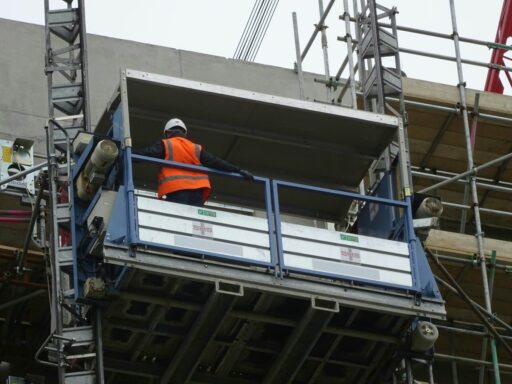The role of a General Contractor Office Manager is multifaceted and pivotal in the construction industry. As the linchpin of project success, they must exhibit a mastery of project management, financial acumen, team leadership, and compliance with industry standards. Their duties span from the initial project planning stages to the final quality checks, ensuring projects are completed on time, within budget, and to the highest standards. This comprehensive overview delves into the core responsibilities, essential skills, industry navigation, career advancement opportunities, and client relations management that define the job description of a General Contractor Office Manager.
Key Takeaways
- A General Contractor Office Manager plays a critical role in project planning, financial oversight, and team coordination, ensuring construction projects meet quality and compliance standards.
- Effective management demands advanced project management techniques, strong communication, and a robust understanding of construction laws and regulations.
- Staying abreast of industry trends, technological advancements, and sustainable practices is essential for navigating the dynamic construction industry.
- Professional development through education, mentorship, and personal branding is key to advancing from an Office Manager to senior management roles within the construction sector.
- The Office Manager’s ability to foster client satisfaction and strategically expand the business is crucial for the growth and success of a general contracting firm.
Core Responsibilities of a General Contractor Office Manager

Project Planning and Development
At the heart of a General Contractor Office Manager’s duties lies the critical task of project planning and development. This involves a meticulous approach to organizing the project’s lifecycle, from inception to completion. To facilitate this process, office managers often rely on a variety of planning and budgeting tools.
Effective project management hinges on the utilization of structured templates and regular updates. For instance:
- Project Timeline Template: Helps track each phase with start and completion dates.
- Budget Template: Assists in managing finances by including estimates for all project-related expenses.
It’s essential to start with broad estimates and refine them as more information becomes available. Additionally, a contingency plan should be in place to address unforeseen challenges, ensuring the project remains on course.
Facing challenges with careful planning and adaptability is key to project success, fostering a sense of accomplishment upon its completion.
Team Leadership and Personnel Management
At the heart of a General Contractor Office Manager’s role is the ability to lead and manage a diverse team effectively. This involves not only overseeing the day-to-day operations but also fostering a collaborative environment where each team member can thrive and contribute to the project’s success. A detailed approach to project management ensures that all aspects of the construction process, from quality assurance to resource management, are handled with precision and care.
Key responsibilities include:
- Supervising employees to maintain high standards of quality control and customer satisfaction.
- Developing and implementing comprehensive safety programs.
- Coordinating the arrival and upgrade of equipment and materials.
- Managing HR-related tasks such as employee management, inventory control, payroll, and expense management.
The office manager must not only be a leader but also a mentor, providing guidance and support to project teams to drive efficiency and ensure compliance with industry standards. It’s about striking a balance between firm management and nurturing talent, with a focus on compliance, transparency, and client satisfaction.
Budgeting and Financial Oversight
A General Contractor Office Manager must ensure the financial health of construction projects. Budgeting and financial oversight are pivotal to maintaining project timelines and preventing cost overruns. This involves a meticulous approach to managing budgets, payments, and liaising with lenders.
Key tasks include:
- Developing and adhering to a comprehensive budget
- Overseeing draw schedules for timely fund disbursement
- Ensuring compliance with building codes and financial regulations
- Regularly updating financial documents to reflect current project status
Financial Preparedness is essential. A clear understanding of the budget, including a contingency fund, is crucial for managing costs effectively.
It’s also important to administer all aspects of bidding with contractors, assess the accuracy of bids, and recommend the best options based on financial data. Retaining specialty engineers and architects as needed, and providing timely internal and external financial updates, are part of the role’s responsibilities.
Quality Control and Compliance
In the realm of general contracting, the office manager’s vigilance in quality control and compliance is paramount. Ensuring that projects adhere to safety codes and regulations is not just about legal conformity; it’s about safeguarding the integrity of the construction and the well-being of all stakeholders involved. Comprehensive reporting and safety adherence are critical components of this role, as they contribute to the overall success and reputation of the company.
The office manager must possess technical expertise to support project development, from obtaining necessary building permits to introducing comprehensive safety programs. This expertise extends to the selection of subcontractors, ensuring they meet the company’s standards for quality and compliance. Managing quality assurance is an ongoing task that requires constant attention to detail and a proactive approach to problem-solving.
The office manager’s role in quality control and compliance is a continuous commitment to excellence and safety in every aspect of the construction process.
Understanding building codes and regulations is akin to knowing the rules of the road for construction projects. It’s the office manager’s responsibility to ensure that every project not only meets but exceeds these standards, thereby preventing legal issues and enhancing customer satisfaction. The approval process for both residential and commercial projects demands meticulous adherence to local building codes, with commercial projects often undergoing a higher level of scrutiny.
Essential Skills for Effective Management

Advanced Project Management Techniques
Mastering advanced project management techniques is crucial for a General Contractor Office Manager to ensure that construction projects are delivered on time, within budget, and to the required quality standards. Effective project management is not just about following a plan; it’s about adapting to the changing dynamics of a construction site and the needs of the team.
- Project Timeline Template: A tool to outline each phase of the project, including task start and completion dates.
- Budget Template: A spreadsheet to track expenses, including estimates for materials, labor, and permits.
Flexibility is a key advantage in project management. Being able to adjust schedules and resources in response to unforeseen challenges is essential. This adaptability can save time and money, while also maintaining the trust and professionalism required for successful construction projects.
Transparency in project management is vital. It fosters a culture of trust among team members and with contractors, which is essential for long-term success.
Effective Communication Strategies
Effective communication is the cornerstone of successful project management in the construction industry. Understanding the emotions and motives behind the information shared is as important as the data itself. This holistic approach ensures that all team members are aligned with the project’s goals and objectives.
To avoid common pitfalls such as miscommunications leading to project delays, it’s essential to implement clear strategies:
- Be Clear and Concise: Ensure that your message is straightforward and easily understood.
- Assess Readiness: Regularly evaluate the team’s understanding and preparedness to execute tasks.
- Plan and Budget: Use tools and templates to communicate financial expectations and timelines effectively.
By fostering an environment where open and respectful communication is the norm, office managers can build strong relationships with subcontractors and suppliers, which can lead to better prices and priority treatment.
Remember, effective use of communication tools and techniques can help anticipate and mitigate potential challenges, keeping projects organized, on time, and within budget.
Problem-Solving and Decision-Making
In the dynamic environment of construction, an Office Manager must be adept at problem-solving and decision-making. These skills are crucial for navigating the complexities of projects and ensuring their successful completion. Utilizing a variety of decision-making tools can significantly enhance an Office Manager’s ability to assess readiness, plan effectively, and manage budgets.
Armed with the right decision-making tools, Office Managers can more accurately manage projects from start to finish, maximizing value and increasing profitability.
Here is a brief outline of tools and considerations for effective problem-solving:
- Checklist for assessing skills, knowledge, and resources
- Case studies for self-evaluation and learning
- Templates and guides for project planning and budgeting
- Considerations for time commitment and skill level
By facing challenges head-on and being willing to learn, Office Managers can lead successful projects and achieve a sense of accomplishment.
Understanding of Construction Laws and Regulations
A General Contractor Office Manager must possess a comprehensive grasp of construction laws and regulations to ensure projects adhere to legal standards and avoid costly violations. Knowledge of building codes, licensing requirements, and permits is fundamental to the role, as it safeguards the project’s integrity and legal standing.
- Zoning Laws: Compliance with local zoning regulations.
- Historic Preservation: Adherence to rules in historic districts.
- Environmental Regulations: Awareness of laws affecting natural resources.
Navigating the complexities of construction laws and regulations is not just about adherence; it’s about integrating legal considerations into every phase of project planning and execution to preemptively address potential issues.
Understanding these legal intricacies is not only about preventing legal repercussions but also about ensuring the safety and well-being of all stakeholders involved. Staying informed about changes in construction laws and maintaining open communication with legal experts are proactive steps that can significantly benefit project outcomes.
Navigating the Construction Industry

Industry Trends and Technological Advancements
Keeping abreast of industry trends and technological advancements is crucial for a General Contractor Office Manager. The construction industry is rapidly evolving, with digital solutions and innovative technologies leading the way to more efficient and safe project outcomes. Understanding the roles of construction contractors in this context is essential.
- Embracing digital transformation in construction management tools.
- Integrating advanced software for project planning and risk management.
- Adopting sustainable practices and green technologies.
The ability to adapt to new technologies and methodologies can significantly enhance project delivery and client satisfaction.
Staying informed about the latest developments can provide a competitive edge and is vital for the strategic planning of future projects. It’s not just about keeping up; it’s about leading the way in a tech-driven construction landscape.
Networking and Relationship Building
In the dynamic field of construction, the ability to forge strong networks and build relationships is indispensable for a General Contractor Office Manager. Professional organizations and forums offer a wealth of resources and opportunities for networking. For instance, the National Association of Home Builders (NAHB) provides a platform for industry professionals to connect and share knowledge.
Effective networking also involves engaging with local communities through workshops and meetups. These gatherings are not only beneficial for learning but also for finding mentors who can guide you through the complexities of the construction industry.
Building and maintaining good relationships with subcontractors and suppliers is equally crucial. It ensures smoother project execution and can lead to more favorable terms and priority treatment.
Here are some tips to enhance your networking and relationship-building efforts:
- Be clear and concise in your communications to set the right expectations.
- Shop around to compare prices and services before making commitments.
- Always treat your partners with respect to foster collaboration and respect.
Remember, a strong network can be a significant asset, providing support, advice, and business opportunities.
Risk Management in Construction Projects
In the dynamic field of construction, risk management is a pivotal aspect of a General Contractor Office Manager’s responsibilities. Identifying risks early on is crucial, as it allows for the development of strategies to mitigate potential issues before they escalate. Types of risks can range from safety hazards to financial uncertainties, and each requires a tailored approach.
Effective risk management involves a series of steps to ensure project stability and success. Here’s a succinct breakdown:
- Identify risks
- Assess impact
- Prepare a response
- Recover losses
- Review results
Builders Risk Insurance and Professional Liability Insurance are essential tools in the arsenal of risk management. They provide a safety net for the project and the professionals involved, covering unforeseen events and professional oversights.
Avoiding common pitfalls such as costly mistakes and budget overruns is also part of effective risk management. This includes careful planning, accurate budgeting, and clear communication with all stakeholders. As Lars Herman suggests, it’s about building a path forward as a team, acknowledging everyone’s viewpoints on risk.
Sustainability and Green Building Practices
In the realm of construction, sustainability and green building practices are no longer optional but essential components of modern project management. General Contractor Office Managers must be well-versed in eco-friendly construction methods and materials to meet both regulatory standards and client expectations.
- Eco-Friendly Materials: Selection of sustainable materials is crucial for reducing the environmental impact of construction projects.
- Energy Efficiency: Implementing energy-saving features and renewable energy sources can significantly lower operational costs and carbon footprints.
- Water Conservation: Techniques for reducing water usage and recycling wastewater contribute to sustainable building practices.
- Waste Management: Effective strategies for waste reduction, recycling, and reuse are vital for minimizing the environmental impact of construction activities.
Embracing these practices not only contributes to the health of our planet but also offers economic benefits through efficiency and innovation. Office Managers play a pivotal role in integrating these practices into the company’s standard operating procedures, ensuring that every project aligns with the latest sustainability standards.
Career Advancement and Professional Development

Educational Pathways and Certifications
The journey to becoming a proficient General Contractor Office Manager often begins with a solid educational foundation. Formal education in construction management, business administration, or a related field is highly beneficial. Certifications can also play a pivotal role in career advancement, providing recognition of expertise and commitment to the profession.
- Bachelor’s Degree in Construction Management
- Master’s Degree in Business Administration
- Certified Construction Manager (CCM)
- Project Management Professional (PMP)
It is essential to stay informed about the varying requirements across different jurisdictions, especially for those looking to expand internationally. Local regulatory knowledge is a key component of success in the construction industry.
Professional organizations offer resources for continuous learning and networking opportunities. They often provide forums, workshops, and seminars that are instrumental in keeping skills sharp and staying abreast of industry changes.
Transitioning to Senior Management Roles
For general contractor office managers aiming to climb the career ladder, transitioning to senior management roles involves strategic planning and a proactive approach to career development. Understanding the landscape of potential roles is crucial, as it can range from project manager to director of construction, or even to owner for those with entrepreneurial aspirations.
To facilitate this transition, consider the following steps:
- Identify your career goals and the roles that align with them.
- Gain experience through varied projects to broaden your skill set.
- Seek mentorship and networking opportunities to learn from industry leaders.
- Continuously update your knowledge on construction management and business practices.
Embracing these steps can significantly enhance your prospects for advancement, ensuring you are well-prepared for the challenges and responsibilities of senior management positions.
The Role of Mentorship and Continuous Learning
In the dynamic field of construction management, mentorship and continuous learning are pivotal for career advancement. Mentors offer insights based on their own experiences, helping professionals navigate the complexities of their roles and make informed decisions. Continuous learning, through resources such as books, courses, and professional networks, ensures that office managers remain up-to-date with industry standards and practices.
Embracing a culture of learning and seeking guidance from seasoned professionals can significantly enhance an office manager’s skill set and strategic approach.
To facilitate this ongoing development, here’s a list of resources and strategies:
- Engage with professional organizations and forums for networking and advice.
- Explore books and online resources that focus on construction management and leadership.
- Enroll in courses that cover advanced project management and industry-specific regulations.
- Regularly review and update personal development plans to align with career goals.
Building a Personal Brand in the Construction Industry
In the construction industry, building a personal brand is crucial for long-term success and recognition. Start by identifying your unique value proposition—what sets you apart from others in your field. This could be a particular expertise in sustainable building practices or a reputation for completing projects on time and within budget.
- Start Small: Begin by establishing a strong reputation on smaller projects and expand your portfolio gradually.
- Consult with a Professional: Seek advice from industry leaders and use their insights to shape your brand.
- Build a Network: Forge connections with other professionals who can endorse your skills and contribute to your brand’s growth.
Embrace continuous learning and stay abreast of industry trends to ensure your personal brand remains relevant and compelling. By doing so, you can position yourself as a thought leader and go-to expert in your niche.
Remember, your personal brand is a reflection of your professional journey. It’s about showcasing your skills, sharing your successes, and communicating your values. Leverage social media, speaking engagements, and professional networking events to amplify your presence in the industry.
The Office Manager’s Role in Client Relations and Business Growth

Client Communication and Satisfaction
In the dynamic environment of construction, the General Contractor Office Manager plays a pivotal role in ensuring client communication and satisfaction. By maintaining regular and transparent interactions with clients, they foster trust and facilitate a smooth project flow.
Effective client communication involves several key practices:
- Timely updates: Keeping clients informed about project milestones and any changes.
- Responsiveness: Quickly addressing inquiries and concerns to prevent misunderstandings.
- Feedback analysis: Utilizing client feedback to enhance service quality and operational efficiency.
By analyzing feedback from these interactions, Office Managers can pinpoint opportunities to improve client satisfaction and streamline administrative processes.
Avoiding real-life communication breakdowns is essential. Miscommunications can lead to project delays, incorrect work, and the need for costly corrections. Proactive measures and comprehensive reporting are necessary to mitigate these risks and uphold safety adherence.
Strategies for Business Expansion
In the dynamic field of construction, a General Contractor Office Manager must be adept at identifying and implementing strategies for business expansion. Diversification of services is a key tactic, allowing the company to tap into new markets and reduce dependency on a single revenue stream.
- Market Analysis: Understand the demand in different sectors and regions.
- Service Expansion: Offer new services that complement existing capabilities.
- Strategic Partnerships: Form alliances with other businesses to broaden your reach.
- Technology Adoption: Utilize modern tools to enhance efficiency and appeal to a tech-savvy clientele.
Embracing innovation and staying responsive to market needs are fundamental to driving business growth.
Investing in staff training and development ensures that the team is equipped to handle new challenges and services. Regularly reviewing and adjusting the business plan to reflect current market conditions is also crucial for sustained expansion.
Marketing and Public Relations
In the competitive landscape of the construction industry, a General Contractor Office Manager must leverage both marketing and public relations to enhance the company’s visibility and reputation. Effective marketing strategies are crucial for attracting new clients and retaining existing ones, while public relations efforts help to build and maintain a positive image in the industry.
- Develop a comprehensive marketing plan that aligns with business goals
- Utilize digital marketing tools to reach a broader audience
- Engage in community events and sponsorships to boost local presence
- Foster relationships with media outlets for positive coverage
A proactive approach to marketing and public relations not only drives business growth but also establishes the company as a thought leader in the construction sector. It’s essential for the Office Manager to coordinate these efforts to ensure consistency and effectiveness across all channels.
Leveraging Technology for Business Efficiency
In the dynamic field of construction, embracing technology is pivotal for enhancing business efficiency. General Contractor Office Managers can significantly streamline operations by integrating advanced software solutions for project management, client relations, and financial tracking.
- Project Management Software: Tools that facilitate scheduling, resource allocation, and real-time communication.
- Customer Relationship Management (CRM): Systems that manage client interactions, improving customer service and retention.
- Financial Software: Applications that provide accurate budgeting, expense tracking, and financial reporting.
By adopting these technologies, Office Managers can not only optimize internal workflows but also provide more transparent and responsive services to clients, which is essential for long-term business growth.
The implementation of such systems requires careful consideration of the company’s specific needs and a strategic approach to training staff. The goal is to ensure that the technology serves as a complement to the skills of the team, rather than a replacement, fostering a culture of innovation and continuous improvement.
Conclusion
In summary, the role of a General Contractor Office Manager is multifaceted, demanding a blend of project management, budgeting, and problem-solving skills. They are the linchpins that ensure construction projects are executed effectively, within budget, and on schedule. This comprehensive overview has dissected the various aspects of the job, from planning and hiring to managing and communicating. Whether considering taking on this role yourself or simply aiming to understand the intricacies of construction management, it’s clear that the responsibilities are substantial but also rewarding for those who are well-prepared. As the construction industry evolves, the General Contractor Office Manager will continue to be a pivotal figure in shaping successful projects and buildings.
Frequently Asked Questions
What are the primary duties of a General Contractor Office Manager?
The primary duties include project planning and development, team leadership and personnel management, budgeting and financial oversight, quality control, and ensuring compliance with relevant laws and regulations.
What skills are essential for a General Contractor Office Manager?
Essential skills include advanced project management techniques, effective communication strategies, problem-solving and decision-making abilities, and a thorough understanding of construction laws and regulations.
How does a General Contractor Office Manager stay current with industry trends?
Staying current involves keeping up with industry trends and technological advancements, networking and building relationships, managing risks effectively, and adopting sustainability and green building practices.
What are some career advancement opportunities for a General Contractor Office Manager?
Opportunities include pursuing further education and certifications, transitioning to senior management roles, engaging in mentorship and continuous learning, and building a personal brand within the construction industry.
How does a General Contractor Office Manager contribute to client relations and business growth?
They play a key role in client communication and satisfaction, devising strategies for business expansion, handling marketing and public relations, and leveraging technology to enhance business efficiency.
Can I manage my own construction project without hiring a General Contractor Office Manager?
Yes, you can manage your own project, which can offer more control and potential savings. However, it requires a broad skill set and carries the risk of costly mistakes, so it’s important to understand the role and responsibilities thoroughly before deciding.





